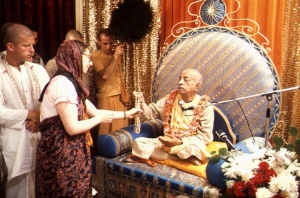CC Antya 5.122: Difference between revisions
m (1 revision(s)) |
No edit summary |
||
| Line 1: | Line 1: | ||
{{ | [[Category:Sri Caitanya-caritamrta - Antya-lila Chapter 05|CC122]] | ||
<div style="float:left">'''[[Sri Caitanya-caritamrta|Śrī Caitanya-caritāmṛta]] - [[CC Antya|Antya-līlā]] - [[CC Antya 5|Chapter 5: How Pradyumna Miśra Received Instructions from Rāmānanda Rāya]]'''</div> | |||
<div style="float:right">[[File:Go-previous.png|link=CC Antya 5.121|Antya-līlā 5.121]] '''[[CC Antya 5.121|Antya-līlā 5.121]] - [[CC Antya 5.123|Antya-līlā 5.123]]''' [[File:Go-next.png|link=CC Antya 5.123|Antya-līlā 5.123]]</div> | |||
{{CompareVersions|CC|Antya 5.122|CC 1975|CC 1996}} | |||
{{RandomImage}} | |||
==== TEXT 122 ==== | ==== TEXT 122 ==== | ||
<div | <div class="verse"> | ||
īśvarera nāhi kabhu deha-dehi-bheda | :īśvarera nāhi kabhu deha-dehi-bheda | ||
svarūpa, deha,—cid-ānanda, nāhika vibheda | :svarūpa, deha,—cid-ānanda, nāhika vibheda | ||
</div> | </div> | ||
| Line 12: | Line 16: | ||
==== SYNONYMS ==== | ==== SYNONYMS ==== | ||
<div | <div class="synonyms"> | ||
''īśvarera''—of the Supreme Personality of Godhead; ''nāhi''—there is not; ''kabhu''—at any time; ''deha-dehi-bheda''—distinction between the body and the soul; ''svarūpa''—personal identity; ''deha''—body; ''cit-ānanda''—all made of blissful spiritual energy; ''nāhika vibheda''—there is no distinction. | |||
</div> | </div> | ||
| Line 19: | Line 23: | ||
==== TRANSLATION ==== | ==== TRANSLATION ==== | ||
<div | <div class="translation"> | ||
"At no time is there a distinction between the body and the soul of the Supreme Personality of Godhead. His personal identity and His body are made of blissful spiritual energy. There is no distinction between them. | |||
</div> | </div> | ||
| Line 26: | Line 30: | ||
==== PURPORT ==== | ==== PURPORT ==== | ||
<div | <div class="purport"> | ||
Lord Kṛṣṇa, the son of Nanda Mahārāja, is advaya-jñāna; in other words, there is no distinction between His body and His soul, for His existence is completely spiritual. According to the verse from Śrīmad-Bhāgavatam beginning with the words vadanti tat tattva-vidas tattvam (1.2.11), the Absolute Truth is always to be understood from three angles of vision as Brahman, Paramātmā and Bhagavān. Unlike the objects of the material world, however, the Absolute Truth is always one and always the same. Thus there is no distinction between His body and His soul. His form, name, attributes and pastimes, therefore, are completely distinct from those of the material world. One should know perfectly well that there is no difference between the body and the soul of the Supreme Personality of Godhead. When one conceives of a distinction between His body and His soul, one is immediately conditioned by material nature. Because a person in the material world makes such distinctions, he is called baddha-jīva, a conditioned soul. | Lord Kṛṣṇa, the son of Nanda Mahārāja, is ''advaya-jñāna''; in other words, there is no distinction between His body and His soul, for His existence is completely spiritual. According to the verse from [[Srimad-Bhagavatam|''Śrīmad-Bhāgavatam'']] beginning with the words ''vadanti tat tattva-vidas tattvam'' (1.2.11), the Absolute Truth is always to be understood from three angles of vision as Brahman, Paramātmā and Bhagavān. Unlike the objects of the material world, however, the Absolute Truth is always one and always the same. Thus there is no distinction between His body and His soul. His form, name, attributes and pastimes, therefore, are completely distinct from those of the material world. One should know perfectly well that there is no difference between the body and the soul of the Supreme Personality of Godhead. When one conceives of a distinction between His body and His soul, one is immediately conditioned by material nature. Because a person in the material world makes such distinctions, he is called ''baddha-jīva'', a conditioned soul. | ||
</div> | </div> | ||
__NOTOC__ | |||
<div style="float:right; clear:both;">[[File:Go-previous.png|link=CC Antya 5.121|Antya-līlā 5.121]] '''[[CC Antya 5.121|Antya-līlā 5.121]] - [[CC Antya 5.123|Antya-līlā 5.123]]''' [[File:Go-next.png|link=CC Antya 5.123|Antya-līlā 5.123]]</div> | |||
__NOTOC__ | |||
__NOEDITSECTION__ | |||
Revision as of 09:07, 2 October 2021

A.C. Bhaktivedanta Swami Prabhupada
TEXT 122
- īśvarera nāhi kabhu deha-dehi-bheda
- svarūpa, deha,—cid-ānanda, nāhika vibheda
SYNONYMS
īśvarera—of the Supreme Personality of Godhead; nāhi—there is not; kabhu—at any time; deha-dehi-bheda—distinction between the body and the soul; svarūpa—personal identity; deha—body; cit-ānanda—all made of blissful spiritual energy; nāhika vibheda—there is no distinction.
TRANSLATION
"At no time is there a distinction between the body and the soul of the Supreme Personality of Godhead. His personal identity and His body are made of blissful spiritual energy. There is no distinction between them.
PURPORT
Lord Kṛṣṇa, the son of Nanda Mahārāja, is advaya-jñāna; in other words, there is no distinction between His body and His soul, for His existence is completely spiritual. According to the verse from Śrīmad-Bhāgavatam beginning with the words vadanti tat tattva-vidas tattvam (1.2.11), the Absolute Truth is always to be understood from three angles of vision as Brahman, Paramātmā and Bhagavān. Unlike the objects of the material world, however, the Absolute Truth is always one and always the same. Thus there is no distinction between His body and His soul. His form, name, attributes and pastimes, therefore, are completely distinct from those of the material world. One should know perfectly well that there is no difference between the body and the soul of the Supreme Personality of Godhead. When one conceives of a distinction between His body and His soul, one is immediately conditioned by material nature. Because a person in the material world makes such distinctions, he is called baddha-jīva, a conditioned soul.